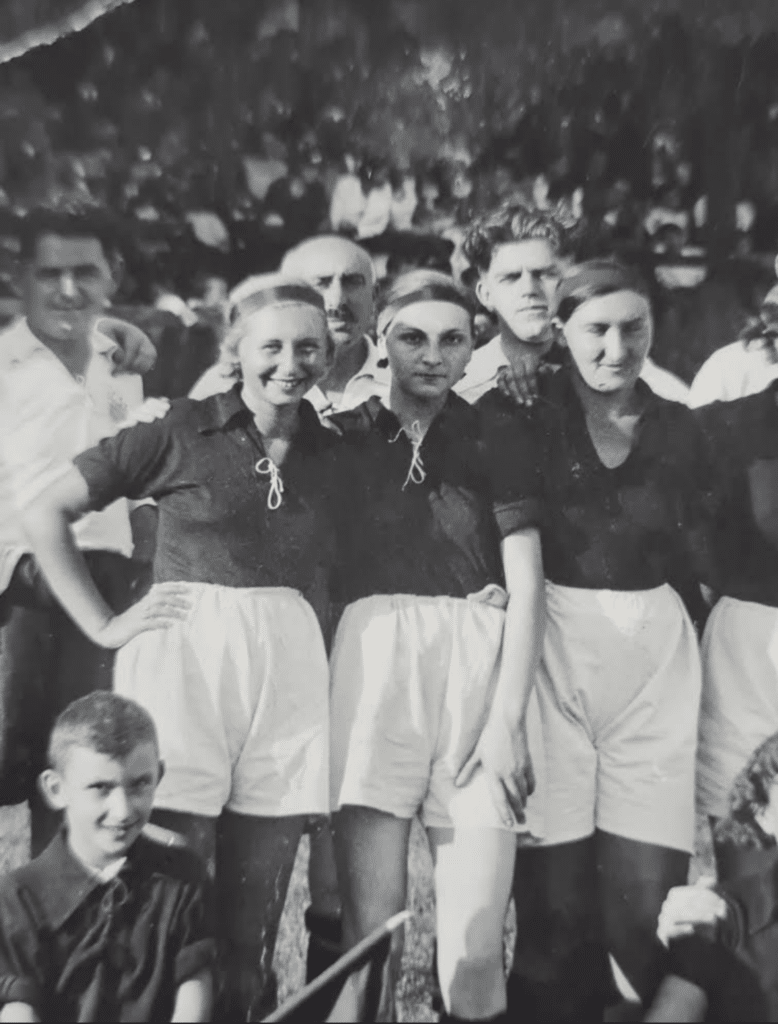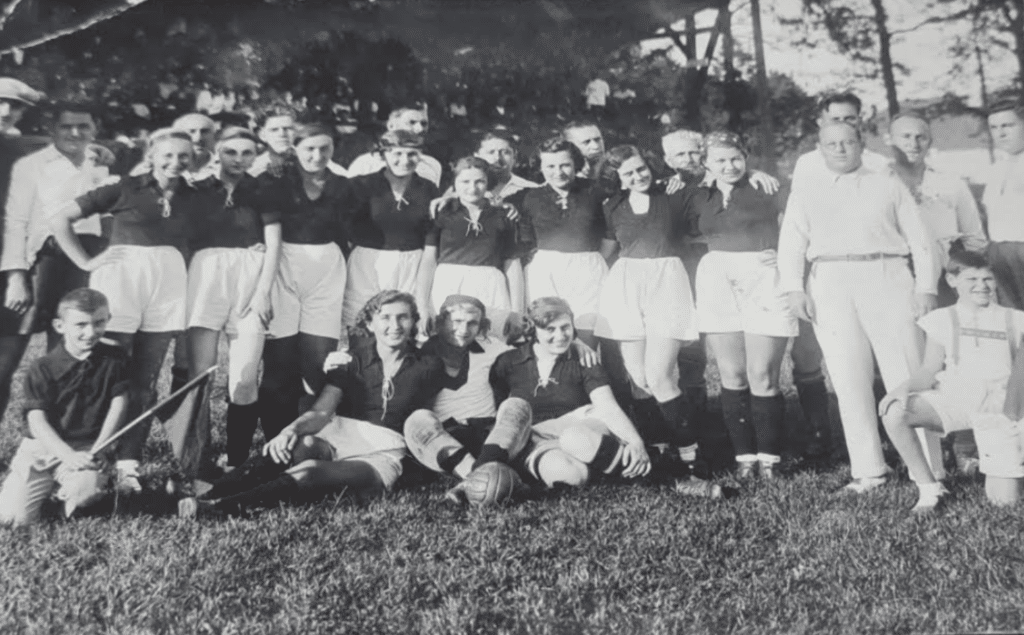Record breaking crowds, smashed TV viewing results, sold out merchandise stocks, the Matilda’s have settled once and for all that there is passion and a market for women’s sport. Just as the Barbie movie is shaking up cinema, the FIFA Women’s World Cup, is challenging tired notions about the marketability and box-office potential of entertainment told with a gendered lens.
None of this has happened overnight. The long road to gender equity in Football has relied on generations of women defying stereotypes, gendered norms and the criticism of men.

Women like Teresa Vugrenic, my grandmother.
Teresa played football in the early 1930’s for Cakovec, a town on the border of the former Yugoslavia and Hungary. Every weekend, she took to the field in long white boxer shorts and starchy polo necks, tamed her stylish honey locks beneath a thick headband, and transformed into a masterful scorer on the wing.
I have a rare and wonderful photo of her on the pitch with her teammates. It’s taken, sometime before WW2. She’s barely twenty years old.
It’s a pre-match team shot of some importance. You can see a full crowd in the stadium behind her shoulders.
When this photo was taken, the FIFA women’s competition was still another 65 years away. Simone De Beauvoir’s The Second Sex had not yet been written, Germaine Greer had not been born, Ruth Handler hadn’t created Barbie and Kotex had only just started manufacturing sanitary napkins.
To say Teresa was a trailblazer is an understatement.
While most of the team is laughing, true to my gene pool, she’s the serious looking one, with Greta Garbo brows, looking directly to camera.
It’s like she’s eyeballing me across generations.
She looks fierce.
Tight lips. Stern eyes. Arched brow.
I kind of recognise this look.
I saw it on Sam Kerr’s face as she readied herself to sub into the match on Monday night. Camera following her every move, there was focus and the fierceness in her eyes, as she stripped to her bra before stadium and nation, to swap into a team jersey for the first time in the competition. Sam Kerr is not just an Australian hero because she is one of the greatest players of all time but because she was part of the ground-breaking collective bargaining agreement that saw the Matildas earn a revenue-sharing deal with their male counterparts.
I’ve seen the same look on Megan Rapinoe’s face, too as she took to the pitch to play her final match for the Stars and Stripes. I had the privilege to see her play last Sunday. At 38 years, she spent most of the match on the benches, but was subbed on at the 70th minute to loud AAMI Park applause, her signature lilac-blue hair tossled by the night wind. Rapinoe lays claim to two “Olimpicos” – a goal scored directly from a corner kick. But it is her actions as a human rights champion taking the knee in support of the Black Lives Matter campaign and a champion of LGBTIQ+ rights in the face of hateful Trumpism that I admire the most.
Tight lips. Stern eyes. Arched brow.
This is the look of a woman in pursuit of excellence. A woman so focussed on the job at hand, there’s no time for the trivialities of media or making nice.
I can tell a lot about this photo of my grandmother.
That she liked to #getshitdone; that she was fit and fast; that she could marshall “bitch-face” when she needed it.
For the first time, it occurs to me, that I may have inherited my competitiveness and will to win from her.
Teresa died when I was nine years old. Too young for me to ask questions about feminism and football. Or what it was like to birth a stillborn child. Or how hard it was to migrate to a new country. Or start her own Salon.
I have vivid memories of her love for me, the eldest of her eight grandchildren. She is a sepia vision of faux-fur, Slivovitz-infused, Eastern European loveliness.
I only learned later in life that she was a badass. The kind of woman even World Leaders didn’t mess with.
Its legend in my family that Teresa wrote directly to Yugoslav President Tito himself, demanding the release of her husband, my Deda, from prison during the War, taking off on a one-woman freedom ride to Zagreb to secure his release. She won.
I’m told, Frank Kovac fell in love with Teresa Vugrenic while she was playing Football. Who can blame him?
There is a raw power, grace and sex appeal when women put their bodies on the line for a goal; when they stand up – alone and together – for what they believe in.
There is reverence for this power. But also fear. There is a reason why women are conditioned not to strive; not to collectively mobilise and punished for playing to win.
Nearly a century has passed since Teresa played Football and while much has changed for women, there are also too many things that remain the same.
Too many of life’s cultural prizes, economic benefits and social solutions are owned by, made for and designed by men.
Most of the time, I feel every single frustrating year of the two centuries the World Economic Forum believes it will take to close the global gender gap.
Most of the time, I feel like Barbie in Ken-land; struggling with the never-ending entitlement of patriarchy.
But then there are moments of change. Like the one we are having right now.
When women’s athleticism, guts and mastery is powerful enough to dominate a 24/7 news-cycle.
When the highest grossing film of the year is a #MeToo made-over Barbie movie, mainstreaming the “F” word.
When it feels like women can achieve anything whether its creating sharp, intelligent comedy, performing personal-is-political drama, wearing fairy-floss fashion or sweating and panting their way through being a post-game hot-mess.
These are the days when life is a Spotify playlist made especially for me of Tori, Joan, Sinead, Tracy, Bey Bey and Tay Tay.
I’m not fool enough to think it will last more than a moment. Soon, it will be back to boys-business as usual. History tells me there is always backlash and punishment after our rise.
By the 1940’s Women’s Association Football was banned in Yugoslavia – as it would be in the UK, Belgium, Spain, Norway and Nigeria – as moral panic and the battle for pitch time, sponsorship and attention after WW2 became too much for the male code to tolerate.
My grandmother would not play again.
Tight lips. Stern Eyes. Arched Brow.
Furious and fierce. #tillitsdonetsdone
#GoMatildas!


